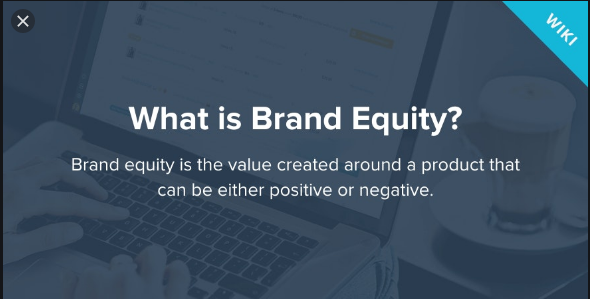Brand equity is an important value premium for a company. With positive brand equity, customers will willingly oblige to pay more of a high price for a company’s products, even though they can actually get the same product from a competitor for less price
What is Brand Equity?
Brand equity is the value premium which a company generates from a product that has a well-known name as compared to a generic equivalent. Companies create brand equity for their products by making them memorable, one to be easily recognized, as well as one that is superior in quality and reliability.
Customers would willingly, pay a price premium in order to do business with a firm they are familiar with and one that they admire.
Importance of Brand Equity
- A firm’s brand equity allows it to make a bigger profit on each sale.
- It increases market share because it results in loyal customers who prefer one brand over the other and as such increases, it’s market share.
- Positive brand equity can charge more for its product more than the actual market price.
- Since brand equity is an intangible asset of an organization, it can like any other asset to be licensed, leased, or sold to others.
- With a positive product brand equity, it is easier for companies to introduce new product lines.
Components of Brand Equity
Components of brand equity include:
Brand Experience
This is the experience the customer has with the overall brand. Customers who a good brand experience, will see the brand as one which is superior and will start preferring it over others.
Brand Association
This anything that the customers relate to their preferred brand and getting in interaction with brands allows for such associations. Thus having a good brand association is very essential, as it leads to repetitive sales and offers the business word of mouth marketing.
Brand Awareness
Brand awareness is actually one of the first stages of the brand-building process which is creating awareness of the brand name in the minds of the consumers. What this means is that customers become aware of the brand and are able to associate it with a particular category. Building brand awareness is an important act that marketers can use to increase brand visibility to the target audience via different advertisement campaigns.
Brand Preference
Brand preference is another aspect of brand equity, which requires organizations to ensure that customers have good experience as well as associations with the brand.
Brand Loyalty
Brand loyalty is when customers prefer a product, over similar products in the market. When this happens, it will result in repetitive sales and is one of the best ways of marketing the product. A company with high brand loyalty, stand a chance of having reduced marketing cost. The company can as well introduce new products which target the same customer base.
Perceived Quality
Customers use quantitative and qualitative parameters to assess brands with other similar brands. Thus fulfilling a brand promise is a strong indicator of brand equity. Quality perception also impacts on the pricing decision of a company. Thus a company that produces quality products, can enjoy the luxury that comes with premium pricing.
How to Build and Manage Brand Equity
To build and manage brand equity, the following three stages must be considered:
Introduction
The introduction of a high-quality product, and using it at a strategic platform from which future products can be launched and made a positive evaluation from the customer point of view is very essential.
Elaboration
When we say elaboration, we mean making the brand to develop repetitive usage by making it easy to recall. The brand attributes must be one that is easily accessible which implies that the customer should easily remember their positive evaluation with that particular product.
Fortification
Companies should ensure that their brands carry a consistent image, in order to reinforce its image in the customer’s mind. Also, brand extensions can also get the brand fortified, even though via relative to products that enjoy a perceived fit in the minds of the customers.
Social Media: Facebook, Twitter, Wikipedia, LinkedIn, Pinterest


